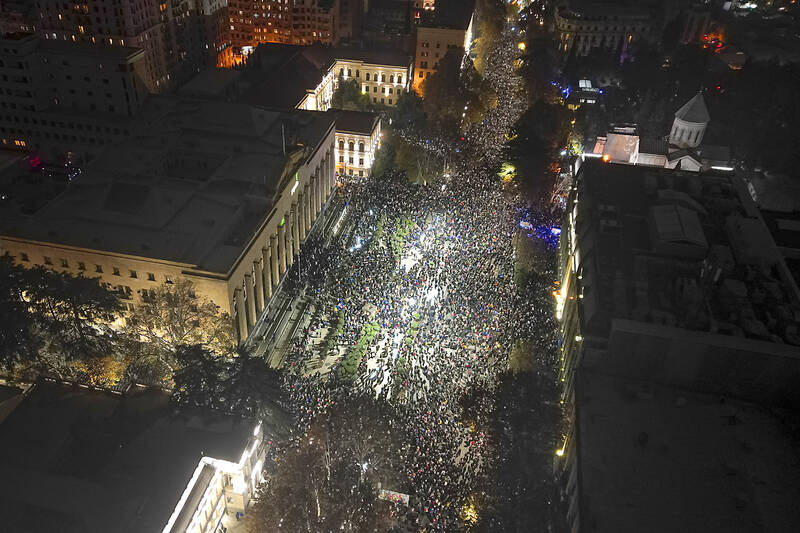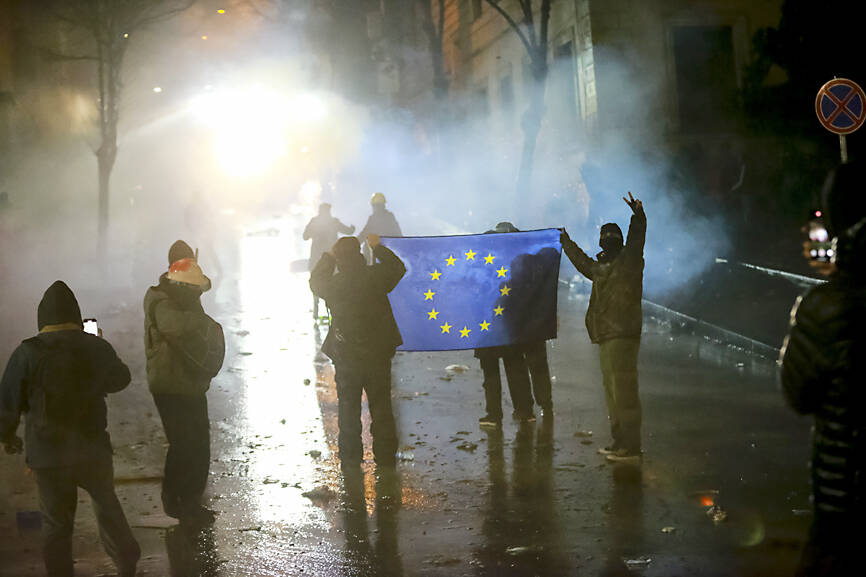Protesters gathered across Georgia on Saturday night in a third straight night of demonstrations against the government’s decision to suspend negotiations to join the EU, while Georgian President Salome Zourabichvili has vowed to stay in office and defy the ruling party’s plan to replace her.
Protesters who were gathered around the parliament building in the capital Tbilisi were pushed by police and special forces toward a nearby square, as they defied warnings to leave the area. Cab drivers used their vehicles to form a barrier between demonstrators and riot police. Zourabichvili said the police are using “illegal methods” on protesters.
The demonstrations were sparked by the ruling party’s announcement last week that it would delay talks on EU membership until 2028. Zourabichvili, whose post is largely ceremonial, has encouraged protests against what she called a “Russian special operation” seeking to restore Moscow’s influence and thwarting Georgia’s goal of joining the EU and NATO.

Photo: AP
The ruling Georgian Dream party’s disputed victory in the country’s Oct. 26 parliamentary election, which was widely seen as a referendum on Georgia’s aspirations to join the EU, has sparked major demonstrations and led to an opposition boycott of the parliament.
The opposition has said that the vote was rigged with the help of Russia, with Moscow hoping to keep Tbilisi in its orbit.
Zourabichvili said that Georgia was becoming a “quasi-Russian” state and that Georgian Dream controlled the country’s major institutions.

Photo: AP
“We have seen happening in the country — which is a country where we do not have any longer independent institutions, not the courts, not the Central Bank, and not, of course, the parliament,” she said. “We have been moving more and more rapidly into a quasi-Russian model.”
Zourabichvili also rejected statements made by Georgian Prime Minister Irakli Kobakhidze, who characterized the protests as “violent demonstrations.”
Kobakhidze in a statement on Saturday said that Tbilisi remained committed to European integration, but unspecified “foreign entities” wished to see the “Ukrainization” of Georgia with a “Maidan-style scenario” — a reference to Ukraine’s 2014 Maidan revolution.
“We are not demanding a revolution. We are asking for new elections, but in conditions that will ensure that the will of the people will not be misrepresented or stolen again,” Zourabichvili said. “Georgia has been always resisting Russian influence and will not accept having its vote stolen and its destiny stolen.”
The government’s announcement that it was suspending negotiations to join the EU came hours after the European Parliament adopted a resolution that condemned last month’s vote as neither free nor fair. It said the election represented another manifestation of Georgia’s continued democratic backsliding “for which the ruling Georgian Dream party is fully responsible.”
European election observers said October’s vote took place in a divisive atmosphere marked by instances of bribery, double voting and physical violence.
The EU granted Georgia candidate status in December last year on condition that it meet the bloc’s recommendations, but put its accession on hold and cut financial support earlier this year after the passage of a “foreign influence” law widely seen as a blow to democratic freedoms.
Georgian Dream last week chose Mikheil Kavelashvili, a former soccer player and current lawmaker, to be their presidential candidate in the Dec. 14 election to replace pro-Europe Zourabichvili. The president would be chosen by the country’s electoral college consisting of 300 people, including all members of parliament, under constitutional changes taking effect this year.
Zourabichvili has also said the October parliamentary elections were illegitimate, and that she is “the only independent and legitimate institution remaining” in Georgia.
“There is no legitimate parliament therefore there is no legitimate president or inauguration. This is why I am staying as your president,” Zourabichvili said in televised address on Saturday.

‘SHORTSIGHTED’: Using aid as leverage is punitive, would not be regarded well among Pacific Island nations and would further open the door for China, an academic said New Zealand has suspended millions of dollars in budget funding to the Cook Islands, it said yesterday, as the relationship between the two constitutionally linked countries continues to deteriorate amid the island group’s deepening ties with China. A spokesperson for New Zealand Minister of Foreign Affairs Winston Peters said in a statement that New Zealand early this month decided to suspend payment of NZ$18.2 million (US$11 million) in core sector support funding for this year and next year as it “relies on a high trust bilateral relationship.” New Zealand and Australia have become increasingly cautious about China’s growing presence in the Pacific

The team behind the long-awaited Vera Rubin Observatory in Chile yesterday published their first images, revealing breathtaking views of star-forming regions as well as distant galaxies. More than two decades in the making, the giant US-funded telescope sits perched at the summit of Cerro Pachon in central Chile, where dark skies and dry air provide ideal conditions for observing the cosmos. One of the debut images is a composite of 678 exposures taken over just seven hours, capturing the Trifid Nebula and the Lagoon Nebula — both several thousand light-years from Earth — glowing in vivid pinks against orange-red backdrops. The new image

ESPIONAGE: The British government’s decision on the proposed embassy hinges on the security of underground data cables, a former diplomat has said A US intervention over China’s proposed new embassy in London has thrown a potential resolution “up in the air,” campaigners have said, amid concerns over the site’s proximity to a sensitive hub of critical communication cables. The furor over a new “super-embassy” on the edge of London’s financial district was reignited last week when the White House said it was “deeply concerned” over potential Chinese access to “the sensitive communications of one of our closest allies.” The Dutch parliament has also raised concerns about Beijing’s ideal location of Royal Mint Court, on the edge of the City of London, which has so

Canada and the EU on Monday signed a defense and security pact as the transatlantic partners seek to better confront Russia, with worries over Washington’s reliability under US President Donald Trump. The deal was announced after a summit in Brussels between Canadian Prime Minister Mark Carney and European Commission President Ursula von der Leyen and European Council President Antonio Costa. “While NATO remains the cornerstone of our collective defense, this partnership will allow us to strengthen our preparedness ... to invest more and to invest smarter,” Costa told a news conference. “It opens new opportunities for companies on both sides of the